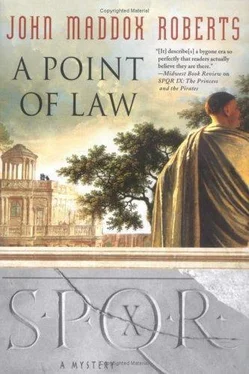John Roberts - A Point of Law
Здесь есть возможность читать онлайн «John Roberts - A Point of Law» весь текст электронной книги совершенно бесплатно (целиком полную версию без сокращений). В некоторых случаях можно слушать аудио, скачать через торрент в формате fb2 и присутствует краткое содержание. Год выпуска: 0101, ISBN: 0101, Издательство: St. Martin, Жанр: Исторический детектив, на английском языке. Описание произведения, (предисловие) а так же отзывы посетителей доступны на портале библиотеки ЛибКат.
- Название:A Point of Law
- Автор:
- Издательство:St. Martin
- Жанр:
- Год:0101
- ISBN:9780312337254
- Рейтинг книги:5 / 5. Голосов: 1
-
Избранное:Добавить в избранное
- Отзывы:
-
Ваша оценка:
- 100
- 1
- 2
- 3
- 4
- 5
A Point of Law: краткое содержание, описание и аннотация
Предлагаем к чтению аннотацию, описание, краткое содержание или предисловие (зависит от того, что написал сам автор книги «A Point of Law»). Если вы не нашли необходимую информацию о книге — напишите в комментариях, мы постараемся отыскать её.
A Point of Law — читать онлайн бесплатно полную книгу (весь текст) целиком
Ниже представлен текст книги, разбитый по страницам. Система сохранения места последней прочитанной страницы, позволяет с удобством читать онлайн бесплатно книгу «A Point of Law», без необходимости каждый раз заново искать на чём Вы остановились. Поставьте закладку, и сможете в любой момент перейти на страницу, на которой закончили чтение.
Интервал:
Закладка:
I stood with feet planted wide and spread my arms, showing off my many lesser scars, most of them won in street brawls but a good many in battle. “I have been wounded in every part of my body, and all these wounds I have suffered on your behalf, the Roman people, the greatest people in the world!” Now the cheering was frantic. When it quieted a little I swung an arm and pointed to Manilius, making sure that everyone got a good look at the long scar inside my right upper arm. Clodius had given me that one with a dagger.
“What wounds, what hardships has this man endured in your service? I’ve heard that he served, briefly, with my friend Gen. Aulus Gabinius in Syria. That excellent general saw immediately what sort of man had been fobbed off on him and never saw fit to give to him any position of distinction. You can bet that Gabinius watched him closely, too! Sent him back home with no commendations, much less decorations for valor, just another time server, putting in enough months with the eagles to qualify him for office!”
I was swinging wild, putting together what little I knew of the man, but I was connecting solidly. His face went scarlet. So this was his weakness, eh?
“The honors fall upon you and your kind,” he shouted, “because the great generals are all your relatives ! So you served in Spain against Sertorius? How did you come by your command of native troops, young as you were? I’ll tell you. It was because your great-uncle was Metellus Pius, who had the command before Pompey took over! Have you served all over Gaul and Britain? It is only because you are married to Caesar’s niece!”
“And now would you defame Julia ?” I bellowed. The growl from the crowd wasn’t pleasant to hear, but at least it wasn’t directed at me. Sallustius had been right. The people adored the Julian women.
“I do no such thing!” He was losing track of his thoughts now. “You are trying to confuse the people with this absurd display and with your wild accusations. You think you can escape your guilt with this spectacle of breeding and glory.”
I held up a hand for silence, and gradually the crowd quieted. It was time for a change of pace.
“Very well. Let’s forget about families and scars, about services to the state and public spectacles, magnificent though they might be. Let us consider”-I paused dramatically-“evidence.”
“Evidence?” he said, as if he had never heard the word. Maybe he hadn’t.
“Yes, evidence. It refers to the tangible and perceptible signs that something has or has not taken place. All those things that do not in themselves constitute proof, but that, taken collectively, point to the truth.”
“The concept is not unknown to me,” he said, gathering up his dignity. But he was playing my game now. “Of what does this evidence of yours consist?”
I cast my gaze around. The crowd was respectfully silent now, intrigued by this unexpected turn. My family looked distressed, afraid that I would now trot out all the business of codes and conspiracies and make myself look like an idiot. I saw familiar faces watching me with varying degrees of anticipation. Pompey looked disgusted. Curio showed a cool amusement, but beneath that was something else: apprehension? A small crowd of high-born women watched from the steps of the Temple of Castor and Pollux, surrounded by their slaves to keep the rabble away. Among them I saw Octavia, watching with a fatalistic resignation. Fulvia was there, looking like she was enjoying herself. Julia smiled at me with sublime confidence. I smiled back, briefly.
“Evidence,” I said, “can take the form of words spoken without thought, words that betray a man’s hidden guilt. But in order for these words to constitute evidence, they must be heard by more than a single witness. Best of all is if they should be spoken in public.”
“Very well,” Manilius said, “what words were spoken and who heard them? Bring forth your witnesses, always taking into account, of course”-here he gestured broadly to the people-“that the rich and powerful can always bribe and suborn all the witnesses they need. Such evidence should be given no more credence than it deserves.”
“Why,” I said, “my witnesses are these citizens assembled in the Forum.” Now it was my turn for the broad, sweeping gesture, taking them all in. “I think that all of these good citizens will agree that just a few moments ago, they heard you say that Marcus Fulvius was held from behind and foully butchered.”
“Yes, so?”
“That he was slashed many times none can doubt. But how did you come to know that he was held from behind?”
“Why-it was obvious.” Now he was badly rattled, unprepared for this.
“Not to me, it wasn’t. Many distinguished men were on the steps of the basilica that day, not only members of my own family but the praetor Juventius, the consular Appius Claudius Pulcher, as well as many honest citizens of all classes. The terrible wounds on the body of Fulvius were apparent to all, but not such subtle details as the fact that he was restrained.”
“It just makes sense!” he cried.
“Not without a certain amount of examination, an impossible task on those steps, in the dim light of early morning. In fact, I had the body taken to the Temple of Venus Libitina and there examined by the famous Asklepiodes. That learned man pointed out to me that Fulvius’s wounds were all on the front of his torso, that he had been unable to turn or to bring his arms into play. Hence, he must have been restrained.
“When I speculated that he might have been bound, Asklepiodes informed me that, in that case, the marks of cords or shackles would have been plainly visible. They were not, hence Fulvius was held , from behind, by at least two powerful men while his assailants plunged their blades into his body. You are no Greek physician, Manilius. How did you know?”
There was dead silence throughout the Forum, and this was more ominous than the growling and shouting had been.
“But I had no cause to wish the death of Fulvius! Citizens, don’t listen to this fool!”
“Oh, you barely knew the man. But then, you don’t act for yourself, do you? Who told you to get rid of him? Might it have been the same person or persons who gave you that fine, rich villa in Baiae? One that is almost as fine as Cicero’s or Pompey’s?” A bit of an exaggeration, but not by much. I pointed up at the great building cloaking the hillside to the west. “The evidence is right there, Citizens! In the Tabularium! Last year, when he declared himself a candidate, he listed among his assets a splendid villa in Baiae that he did not own on the last census!”
The low rumble came again from the crowd. Even when I was inciting it, I was dismayed and frightened by how easily they could be swayed. One minute they thirsted for my blood, the next for his.
“He was bought! Tell us, Manilius! Who owns you? Who were your accomplices in the murder of Marcus Fulvius? Were they one and the same?” Now I looked around again. The Marcelli were nowhere to be seen, but they could be lurking in the shade of porticoes or hiding in covered litters. Curio had gone pale. Curio, who had told me that he and Manilius had worked closely together the previous year. Curio, who had somehow known that Fulvius had been murdered elsewhere and carried to the basilica steps.
“You barely knew the man. But there are men in the Senate, and prominent members of the Equestrian Order, who know otherwise. In the last year, Fulvius gave a number of dinners where radical politics were discussed. You were at every one of those gatherings, weren’t you, Publius Manilius? Remember, this crowd is full of witnesses who know the truth, though they may be hesitant to speak up now. They also know that the policies you now espouse are at variance with those discussed in those meetings. You and Fulvius had a falling-out, didn’t you? A deadly one.”
Читать дальшеИнтервал:
Закладка:
Похожие книги на «A Point of Law»
Представляем Вашему вниманию похожие книги на «A Point of Law» списком для выбора. Мы отобрали схожую по названию и смыслу литературу в надежде предоставить читателям больше вариантов отыскать новые, интересные, ещё непрочитанные произведения.
Обсуждение, отзывы о книге «A Point of Law» и просто собственные мнения читателей. Оставьте ваши комментарии, напишите, что Вы думаете о произведении, его смысле или главных героях. Укажите что конкретно понравилось, а что нет, и почему Вы так считаете.









